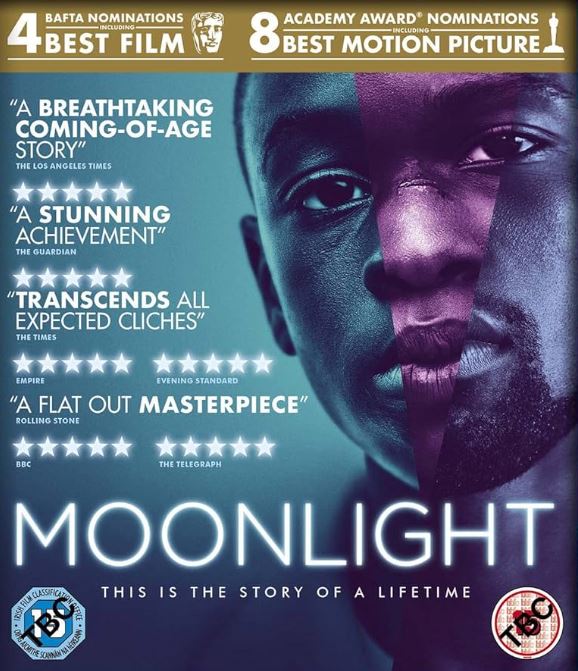Summary of the movie Moonlight
“Moonlight” is an American film directed by Barry Jenkins and released in 2016.
The film is divided into three chapters, which tell the story of Chiron, a young African-American who grows up in a marginal neighborhood in Miami.
Throughout the three stages of his life, we see how Chiron deals with his sexual identity, his relationship with drugs, and the violence surrounding his environment.
The film is an intimate and moving look at the life of a man seeking to find himself and his place in the world.
“Moonlight” is a critically and popularly acclaimed film, and received numerous awards, including the Academy Award for Best Picture in 2017.

Plot
“Moonlight” tells the story of Chiron, a young African-American who grows up in a poor neighborhood in Miami.
The plot is divided into three crucial moments in Chiron’s life: his childhood, adolescence and adulthood:
- Chiron’s childhood.
Firstly, the film focuses on Chiron’s childhood, where he lives with his addicted mother and suffers constant abuse from his schoolmates.
During this stage, Chiron meets Juan, a drug dealer who becomes a father figure to him. Juan and his partner Teresa provide support and emotional stability to Chiron, being the only positive role models he has in his life. - Chiron’s Adolescence.
The plot continues with Chiron’s adolescence, where he faces the typical challenges of puberty while experiencing his sexual identity. During this stage, Chiron is attracted to his friend Kevin, but social pressure and fear of rejection lead him to repress his feelings. However, an intimate encounter between the two changes Chiron’s life, who feels confused and vulnerable. - Chiron’s adulthood.
Finally, as an adult, Chiron has become a successful, muscular drug dealer who calls himself “Black.”
Despite his apparent strength, Chiron continues to hide his true identity and leads a lonely and painful life. However, an unexpected call from Kevin leads him to return to Miami and confront his past, facing his fears and finding the possibility of redemption and love. - Main argument.
The main plot of “Moonlight” revolves around Chiron’s struggle to find his identity and accept himself in a hostile environment.
The film explores themes of race, sexuality, masculinity and the construction of personal identity.
Through a subtle and emotionally powerful narrative, “Moonlight” portrays the challenges of growing up in an adverse environment and how these can influence the construction of our identity.
Main Actors
The main actors of the movie “Moonlight” are:
- Trevante Rhodes as Chiron “Black”
- Andre Holland as Kevin
- Ashton Sanders as Teenage Chiron
- Jharrel Jerome as Teenage Kevin
- Alex Hibbert as Child Chiron
- Jaden Piner as Kevin Child
- Mahershala Ali as Juan
Awards received by actors
The actors of “Moonlight” have received several awards for their outstanding performances in the film. Below are some of the awards received by the main actors:
- Mahershala Ali (John):
Academy Award for Best Supporting Actor.
Screen Actors Guild Award for Best Supporting Actor.
New York Film Critics Circle Award for Best Supporting Actor.
San Francisco Film Critics Circle Award for Best Supporting Actor. - Trevante Rhodes (Chiron):
Best Actor Award at the Gotham Film Festival.
New York Film Critics Circle Award for Best Actor. - Ashton Sanders (young Chiron):
Award for Best Supporting Actor at the Gotham Film Festival.
These are just a few of the awards received by the “Moonlight” actors, but the film as a whole has also been honored with numerous film festival honors and industry awards.
Film Production
Production on the film “Moonlight” began in 2015 when director Barry Jenkins adapted Tarell Alvin McCraney’s script. The film was produced by Adele Romanski, Dede Gardner and Jeremy Kleiner.
Casting for the film was an intense process, and an exhaustive search was conducted to find the right actors to play the main characters at different stages of their lives. Mahershala Ali, Naomie Harris, Trevante Rhodes, André Holland, Janelle Monáe and Ashton Sanders were cast in the lead roles.
Filming for the film took place in Miami, Florida, over 25 days. Jenkins used a combination of real locations, such as the Liberty Square Housing Project and Miami Beach, as well as sets built specifically for the film. The production team worked closely with local residents to obtain the authenticity needed in the representation of the community.
The film was shot digitally using Arri Alexa cameras, allowing Jenkins to experiment with different filmmaking techniques to create the film’s unique visual atmosphere. Director of photography James Laxton played a key role in creating the lighting and composition of scenes, using colors and shadows to reflect the moods and emotions of the characters.
After filming was completed, post-production on the film was done, which included editing, sound mixing, and music. Nicholas Britell was responsible for composing the film’s original soundtrack, which became a key element to the film’s narrative and tone.
“Moonlight” premiered at the Telluride Film Festival in September 2016 to critical acclaim. The film later won several awards, including the Academy Award for Best Picture in 2017.
The production of “Moonlight” was a collaborative effort between the production team, the director and the talented actors who brought the story to life. The film stands out for its visual beauty, its moving script and its authentic representation of the life of a young African-American man in Miami.
Music from the movie “Moonlight”
The music of the movie “Moonlight” includes songs by artists such as Jidenna, Goodie Mob, Caetano Veloso, Boris Gardiner, Barbara Lewis, among others.
Composer Nicholas Britell created an original soundtrack for the film.
Some of the featured songs from the film are “Classic Man” by Jidenna, “Cell Therapy” by Goodie Mob, and “Cucurrucucú Paloma” by Caetano Veloso.
Moonlight movie awards and nominations
The film “Moonlight” has received numerous awards and nominations. Some of the most notable ones include:
- Academy Awards (2017):
Won in the categories of Best Picture, Best Supporting Actor (Mahershala Ali) and Best Adapted Screenplay.
It also received nominations in the categories of Best Director, Best Lead Actor (Trevante Rhodes), Best Supporting Actress (Naomie Harris), Best Cinematography and Best Editing. - Golden Globe Awards (2017):
Won in the categories of Best Motion Picture – Drama and Best Supporting Actor (Mahershala Ali).
It received nominations in the categories of Best Director, Best Lead Actor (Trevante Rhodes), Best Supporting Actress (Naomie Harris) and Best Screenplay. - Screen Actors Guild Awards (2017):
Won in the category of Best Cast in a Motion Picture. - BAFTA Awards (2017):
Won in the categories of Best Film and Best Supporting Actor (Mahershala Ali).
It was also nominated in the categories of Best Director, Best Lead Actor (Trevante Rhodes), Best Supporting Actress (Naomie Harris), Best Original Screenplay and Best Editing. - New York Film Critics Circle Awards (2016):
Won in the categories of Best Picture, Best Director and Best Supporting Actor (Mahershala Ali).
These are just some of the awards and nominations received by “Moonlight.” The film has been widely acclaimed by critics and has garnered recognition at numerous film festivals and award ceremonies around the world.
Reviews of the movie moonlight
These are just some of the main criticisms received:
- The film is very slow and the plot develops in a tedious manner, which can cause the viewer to lose interest.
- The characters are not well developed and it is difficult to connect with them emotionally.
- The film addresses topics such as identity and sexuality in a superficial way, leaving questions unanswered and without delving into the complexity of these topics.
- The use of constant flashbacks can be confusing and makes the story difficult to understand.
- The lack of dialogue and excessive silence in many scenes can make the film boring and uninteresting.
- The plot does not present a clear conflict or climax, which can leave viewers feeling incomplete.
- The film lacks originality and feels like a repetition of themes and situations already seen in other films about growing up and identity.
- The cinematography and direction do not particularly stand out and do not contribute anything new visually.
- Some scenes and dialogues are too pretentious and meaningless, making it difficult to connect with the audience.
- The film could have gone deeper into the relationship between the main characters and not just stayed in small fragments of their lives.
Conclusion
The film Moonlight is a thoughtful and emotionally powerful portrait of the life of a young gay African-American man named Chiron. Throughout three different stages of his life – childhood, adolescence and adulthood – we follow his struggle to accept his identity and find his place in the world.
The film addresses issues of identity, race, sexuality and masculinity in an honest and heartbreaking way. Through subtle and visually beautiful storytelling, director Barry Jenkins manages to convey deep emotions and feelings without resorting to direct explanation.
The character of Chiron is magnificently played by three different actors, each bringing their own intensity and vulnerability to their portrayal of him. Mahershala Ali also excels in his role as Juan, a flawed but understanding confidant and father figure to Chiron.
Jenkins’ direction is masterful, capturing scenes of great visual beauty and elegance. The film is full of symbolism and subtle metaphors that resonate with the viewer and allow them to reflect on the deep themes it addresses.
Ultimately, Moonlight is a film that invites us to reflect on the complexity of human identity and the importance of acceptance and self-love. It is a powerful reminder that we can all find our own light in the midst of darkness and that our true essence and worth cannot be defined by social or cultural expectations.

